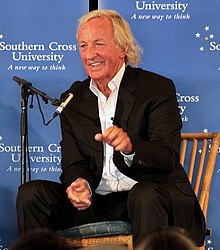John Pilger | |
|---|---|
 Pilger in 2011 | |
| Born | 9 October 1939 Bondi, New South Wales, Australia |
| Died | 30 December 2023 (aged 84) London, England |
| Nationality |
|
| Education | Sydney Boys High School |
| Occupations |
|
| Spouse |
Scarth Flett (divorced) |
| Partner | Jane Hill |
| Children | 2, including Zoe |
| Awards | Full list |
| Website | Official website |
John Richard Pilger (/ˈpɪldʒər/; 9 October 1939 – 30 December 2023) was an Australian journalist, writer, scholar and documentary filmmaker.[1] From 1962, he was based mainly in Britain.[2][3][4] He was also a visiting professor at Cornell University in New York.[5]
Pilger was a critic of American, Australian, and British foreign policy, which he considered to be driven by an imperialist and colonialist agenda. He criticised his native country's treatment of Indigenous Australians. He first drew international attention for his reports on the Cambodian genocide.[6]
Pilger's career as a documentary film maker began with The Quiet Mutiny (1970), made during one of his visits to Vietnam, and continued with over 50 documentaries thereafter. Other works in this form include Year Zero (1979), about the aftermath of the Pol Pot regime in Cambodia, and Death of a Nation: The Timor Conspiracy (1993). His many documentary films on indigenous Australians include The Secret Country (1985) and Utopia (2013). In the British print media, Pilger worked at the Daily Mirror from 1963 to 1986,[7] and wrote a regular column for the New Statesman magazine from 1991 to 2014.
Pilger won Britain's Journalist of the Year Award in 1967 and 1979.[8] His documentaries have gained awards in Britain and abroad,[7] including a BAFTA.[9]
- ^ Buckmaster, Luke (12 November 2013). "John Pilger's Utopia: an Australian film for British eyes first". the Guardian. Retrieved 18 May 2018.
- ^ [1]Andrei Markovits and Jeff Weintraub, "Obama and the Progressives: A Curious Paradox", The Huffington Post, 28 May 2008.
- ^ Sutton, Candace (1 March 2013). "Aboriginal squalor among Australia's 'dirtiest secrets' says expat". The Australian.
- ^ "BFI Screenonline: Pilger, John (1939–) Biography". Screenonline.org.uk.
- ^ "As the election closes in, John Pilger denounces Americanism". New Statesman. 2004. Retrieved 23 July 2021.
- ^ Maslin, Janet (29 April 1983). "Film: Two Perceptions of the Khmer Rouge". The New York Times. Retrieved 18 May 2018.
- ^ a b Biography page, Pilger's official website.
- ^ "Press Awards Winners 1970–1979, Society of Editors". Archived from the original on 25 October 2017.
- ^ "John Pilger". IMDb. Retrieved 18 May 2018.